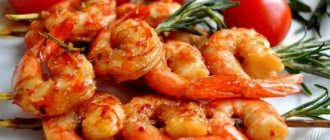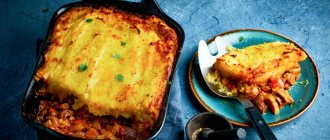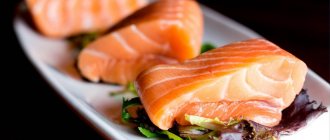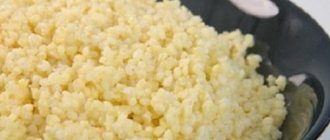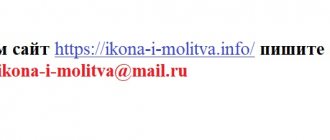Is it possible to eat fish during Lent?
First, let's look at the most popular seafood dish. Fish. Many priests are very categorical in relation to it and in relation to other seafood, saying that you cannot eat seafood during Lent at all, but it all depends on what kind of Lent it is and what day of Lent it is.
As for Lent, on Palm Sunday , for example, it is permissible to treat yourself to fish. The same is true with the Annunciation of the Virgin Mary , except when it coincides with Holy Week. Here you can no longer eat fish.
During Petrov Fast , fish, like other seafood, is allowed every day, excluding the third and fifth days of each week.
During the Dormition Fast, fish and other seafood can be eaten on the same day - on the Transfiguration of the Lord.
During the Nativity Fast, fish and seafood can be eaten daily, but on the third and fifth days of each week, as well as from the second to the sixth of January, fish is prohibited.
How to deal with your sex life
The complete prohibition of sexual life during Lent is one of the most persistent myths. It’s important to make a reservation here right away. All church regulations regarding physical intimacy apply exclusively to married spouses. Everything else, including marriage registered in the registry office, as well as what we usually call “civil marriage,” is considered by the church to be prodigal cohabitation and, naturally, does not approve either during Lent or during other periods.
Abstinence from physical intimacy between married spouses is prescribed not only during Lent, but also in the week preceding it, as well as in the first week after Easter (so as not to be distracted from spiritual joy). This, as you understand, is more than two months. It’s good if both spouses are deeply religious people, but what if only one person in the family came to faith?
In short, the church tries not to interfere in this interesting area of human relationships. If the spouses cannot figure it out themselves, they can consult their confessor. At the same time, reasonable priests advise their spiritual children to act in such a way as not to jeopardize peace and harmony in the family, which is more important than observing many rules. It’s better to resolve issues that concern only two people among themselves, without bringing them up for discussion with anyone else.
Is it possible to eat caviar during Lent?
With caviar, everything is not as strict as with fish, but there are still restrictions. Information about the permissibility of eating it on certain days of fasting has been preserved in old scriptures. For example, you can eat a little game on Lazarus Saturday. This day comes before Palm Sunday. Also during Great Lent, eating caviar is permitted on the Annunciation Day. Caviar can be eaten on all days allowed for seafood during fasting. However, you should not overuse treats. This alienates a person from God and turns good practice for enriching the soul into an ordinary formality, hiding the most common gluttony. All fasting people should remember this.
Is it necessary to rinse with vodka on the first day of fasting?
It is believed that in Rus' there was such a tradition: on the first day of Lent, which is called Clean Monday (also called Monday of Holy Week), you need to rinse your mouth with vodka to rinse the remnants of fast food from your teeth.
Let's face it, this is a myth, and a very harmful one at that. If such a tradition existed somewhere, then it is not worth considering it worthy of following. Since on the first Monday of Lent it is customary to refuse food altogether in order to take a break from the excesses of Maslenitsa, brushing your teeth with vodka on an empty stomach will not lead to anything good. Of course, not only medicine, but also the church, frankly speaking, condemns this savagery.
And in general, vodka and fasting are incompatible. Adult believers are allowed to drink a little wine on Saturdays (except Holy Saturday) and Sundays, as well as on the Feast of the Annunciation. Just a little and just wine. Fasting people should stay away from vodka.
Is it possible to eat shrimp during Lent?
Shrimp are known for their pleasant taste and the fact that they allow you to fill up with just a little bit of them. This is a very dietary dish that will not add extra pounds to you. However, fasting is not about earthly food, but spiritual food, and shrimp clearly does not go well with it. At least on the territory of our vast country. Fasting requires giving up delicacies and all sorts of excesses. In our country, shrimp is far from the most common product, while in Greece it is an everyday food, and therefore shrimp can be eaten even during Lent on days when you can eat butter. Since our shrimp are a specific product, before eating them, you should consult with a priest. If you ate shrimp every day and before Lent, then it is likely that they do not have much significance for you. Then they can be eaten during Lent on the days allowed for seafood. However, if this food is some kind of special delicacy for you, then you should abstain, paying attention to simpler and more affordable food.
Recipes for Lent
Is it possible to eat crab sticks during Lent?
Crab sticks are a very interesting topic of conversation when discussing the rules of fasting. First, it is worth noting that no crab was harmed in the creation of this food product. It’s too expensive to get real crabs for meat, so a replacement was invented. Instead of crab meat, these sticks contain ordinary fish, which means that during fasting, crab sticks are treated in the same way as with any other seafood. You can eat crab sticks during Lent, but only on fish days.
Squid
Many people who like to fast are guided by certain rules. Some say that during these days it is forbidden to eat meat, but you can include plant-based and bloodless foods in your diet. If we take this rule into account, then squid is the optimal product during fasting. This representative of the marine fauna is related to the chordates. This suggests that they are bloodless. But the priests say that it is also forbidden to eat squid every day during Lent. If you take into account the rules of fasting, it is forbidden to eat food of animal origin. Squids are related to it. They can be included in the diet, like any other seafood, only on permitted days.
Yandex pictures
Is it possible to eat shellfish during Lent?
When it comes to shellfish, people always remember their incredibly beneficial properties, and no one argues with this. There is some debate about whether these seafood can be consumed during fasting. Some say that since it is food of animal origin, it is impossible to eat it during fasting, while others classify shellfish as fish. Even among clergy there is no clear point of view on this issue. All are based on different facts. One way or another, regardless of your decision, you shouldn’t eat them all the time during fasting, but only occasionally on the days allowed for seafood.
Cooking methods
For soup and salad, canned or smoked shellfish are suitable, which do not require additional processing. Carcasses are used for stuffing. They need to be boiled. Heat treatment lasts no more than 2-3 minutes so that the pulp does not lose its taste and beneficial properties. Boiled squid can also be used to make soups and salads.
Soup
Throw 1 bay leaf, 100 g of potatoes and 100 g of carrots, chopped into strips, into boiling water (1 liter).
After 10 minutes, add 2-3 tbsp. l. vegetable oil. After this, squid meat, cut into small pieces, is added to the soup. Then remove the pan from the heat. The dish is infused for 5 minutes. Before serving, add a pinch of salt and 50 g of herbs. [media=
https://youtu.be/4UjnvHdBubE
]
Salad
Grind 300 g of squid meat, 2 tomatoes, 1 cucumber, 1 carrot and ¼ medium-sized onion. The salad is seasoned with vegetable oil. It is advisable to remove the skin from tomatoes and cucumbers.
Is it possible to eat squid during Lent?
Many believers, when choosing their diet for the entire Lent, are guided by one criterion. This criterion states that you cannot eat meat foods, but you can eat plant-based and bloodless foods. Based on this, squids seem to be a very acceptable food for Lent, because they belong to the class of chordates, which means they are bloodless. However, you can’t eat squid every day during Lent either. Fasting prohibits the consumption of any food of animal origin! And squids are one of them. You can eat them, like any other seafood, only on certain days of fasting. In ancient times, some parishes classified fish and other seafood as sea creatures and did not consider them food of animal origin, but time has put everything in its place.
Shellfish
Shellfish are tasty seafood products that contain a large amount of vitamins and microelements. This indicates a beneficial effect on the body. But many people have a question: is it possible to eat shellfish during fasting? Some people say that it is a product of animal origin, so shellfish should not be consumed. But others classify them as fish, so it is possible to consume them on days when seafood is allowed. Even the priests themselves cannot specifically answer the question regarding the use of shellfish for food. The location has different facts. But regardless of the person’s opinion, it is recommended to consume shellfish occasionally during fasting, but only on the days allowed for this.
Yandex pictures
Is it possible to eat crayfish during Lent?
Having read the above information about when you can eat seafood during Lent, an Orthodox Christian may decide that if you fast and eat seafood only on the days allotted for them, then you can eat everything that our reservoirs give us by the will of the Lord. However, there are some problems with this. We'll talk about crayfish. Crayfish are very nutritious and rich in vitamins along with the amino acids we need so much. Why is it not useful? Question. Is it possible to eat crayfish during Lent? This lies in the area of the laws of Lent. After all, crayfish are undoubtedly a delicacy, since few of us eat them very often. In addition to the fact that crayfish are a delicacy, they are also an appetizer for the most popular alcoholic drinks: vodka and beer. So, a small violation on the wrong day of fasting can lead to an even greater violation of it, and therefore the meaning of this important action will be lost. So be careful when eating crayfish during Lent, although they, like other seafood, can be eaten during Lent on fish days.
Is it possible to eat chocolate during Lent?
Cancers
If you study all the information presented, you can draw some conclusions. During fasting, you are allowed to consume any type of water product on the permitted days. But there are a number of problems. It's worth considering the crayfish. These representatives of marine fauna are endowed with a large amount of vitamins and microelements. They are very nutritious and beneficial creatures. They also contain a large number of amino acids.
Yandex pictures
But crayfish are a real delicacy. Few people eat them daily. But besides the fact that crayfish are a delicacy, they are also an appetizer for the most popular alcoholic drinks. This is vodka and beer. Therefore, you can seriously break your fast by eating crayfish on any day. During fasting, some caution must be observed. Some recommend stopping its consumption altogether. If you want to taste crayfish, then you need to do it only on permitted days.
The meaning of the post. What seafood can you eat during Lent?
One of the most important parts in the life of an Orthodox Christian is fasting. At this time, you should pay special attention to communication with God, pray fervently and reflect on your life: how correctly you act with others and whether you are not alienating yourself from God by committing sinful acts. For an Orthodox Christian, fasting is at the same time a test of faith and a cleansing of soul and body. It is for this reason that during Lent, temporary restrictions are established on the consumption of certain types of food, including seafood. It is worth remembering, however, that the Lord does not give a person those trials that he cannot endure. Someone can sit through the entire Lent on just bread and water, while for others, giving up meat is a serious blow to their health.
As the clergy advise, fasting should be calculated depending on your strength. Those for whom life becomes unbearable without meat should listen to their advice. Meat can be replaced with seafood and eaten on Saturdays and Sundays. No one will say anything bad to you if you eat seafood in moderation and maintain your strength.
Moreover, seafood, due to its iodine and phosphorus content, promotes mental work, feeding your brain with useful microelements. Pregnant women are not recommended to strictly fast and not eat fish, as this may affect the health of the unborn baby. We all should take care of our health, because it is a gift from God.
The main thing to remember is that fasting is not a physical test, first of all, but a spiritual one. Fasting develops spiritual strength in us. What good will spiritual power be if we harm our body? God does not require man to suffer, for he loves us. God is love! There is nothing wrong with choosing a diet that you can handle. The main thing is not to deviate from it throughout the fast and, in addition to food restrictions, especially try not to do bad things, and also pray every day. God bless you!
What happens if you eat meat during fasting?
There is a myth that if you eat something modest during fasting, even by accident, then God’s inevitable punishment is provided for this. It is a myth. There are people who, in Orthodoxy, are quite “legally” exempt from fasting: children, pregnant and lactating women, the elderly and sick, as well as those who have to work hard, who are in prison, and so on. It also happens: a person who strictly fasts finds himself in a situation where refusing a quick treat means seriously offending his neighbor (and for a Christian, all people are brothers and sisters in Christ). It is believed that for the sake of peace and harmony it is better to break the fast than to provoke a quarrel. And even more so, you shouldn’t reproach and punish yourself if you accidentally ate something savory. It is much worse if you boast of your fasting in front of your neighbors, without hiding your condemnation of those who are fasting. This behavior is considered sinful.
Nutritional value of squid, shrimp, mussels and octopus
Squid, shrimp and mussels are low-fat types of seafood that are also low in calories. By consuming them, you can easily add proteins to your diet without adding fat. You can count about 140 calories per 85 grams of octopus and only 1.8 grams of fat. Squid is a very good source of iron. Lack of iron can lead to weakness, fatigue and anemia.
You will also find calcium, potassium, phosphorus and selenium in these seafood. It provides the body with many important vitamins such as vitamin C, vitamin A, various types of vitamin B, and various omega-3 fatty acids. Omega-3 is an important nutrient that reduces the likelihood of heart disease. It also reduces the likelihood of cancer and depression. This gives our immune system a big boost and helps children's brain development.
Is it possible to eat chocolate during Lent?
Squid, shrimp, mussels and octopus also contain taurine, which is an organic acid that acts as an antioxidant. Taurine protects the body from stress. This substance is also believed to help prevent heart disease, although there is still no conclusive research for it. Some studies have also shown that taurine improves blood sugar levels. Also, these seafood contain relatively little cholesterol (about 45 mg per 100 g) or about a third less than meat and even fish.


